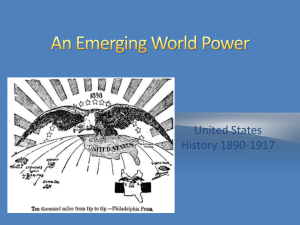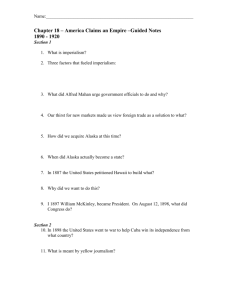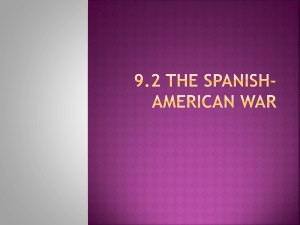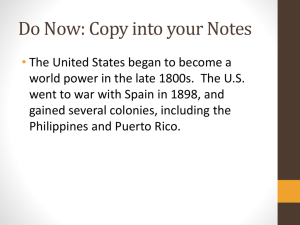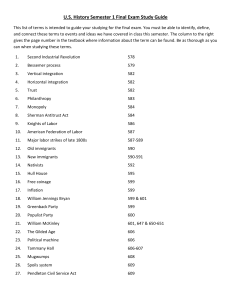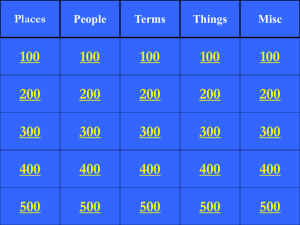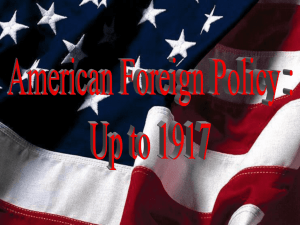New Imperialism
advertisement
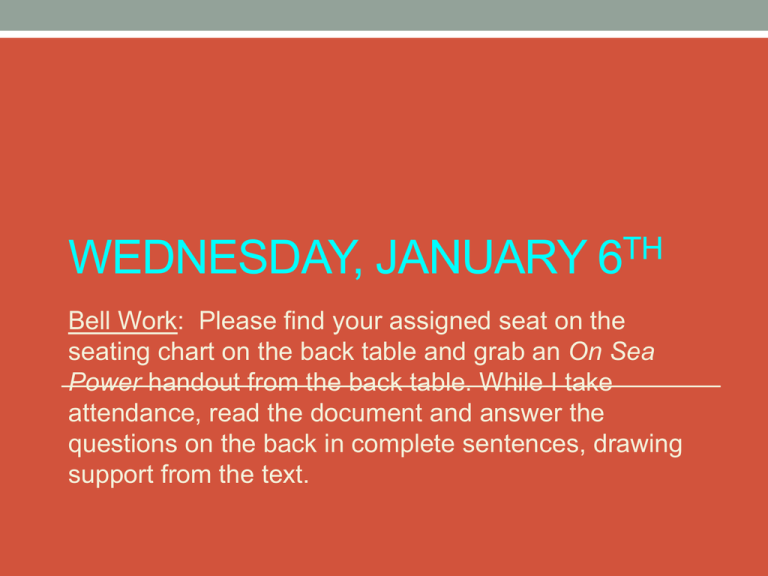
WEDNESDAY, JANUARY TH 6 Bell Work: Please find your assigned seat on the seating chart on the back table and grab an On Sea Power handout from the back table. While I take attendance, read the document and answer the questions on the back in complete sentences, drawing support from the text. Daily Agenda: • Bell Work: On Sea Power • Discussion: A New Semester • Simulation: 1898 • Lecture: Imperialism • Summarizer Essential Question: Should the U.S. intervene in world affairs? Did imperialism or economic development make America a world power? Homework: Read AMSCO Chapter 20 and complete Short Response (due Friday). Honors US History • EOC and AP Style Tests • More Writing… Essays every unit • More frequent quizzes • 4 units left, with review days of old units mixed between • This is your graduation requirement! (Not last semester) • You will take the EOC and AP exam this semester • Contact 352-462-2750. Text or call with questions. Trouble in Cuba? • You will be working in groups of 5 based on the color of the worksheet you picked up. • Each group should number off 1-5. • 1= McKinley • 2= Sec. of Navy • 3= Asst. Sec. of State • 4= Sec. of War • 5= Political Advisor Debriefing Questions: • How much did public opinion sway your decisions? • Was one advisor particularly persuasive? Why? • Did reaction in the news media influence you? • Did you consider that we might lose the war? • Did the weakness of the army cause you any worry? • How does the present military strength of the U.S. compare with our strength in 1898? • Would public opinion today reflect the same attitude toward such a war? Simulation Directions: • Mr. Naruta will hand each of you a slip of paper. The paper will either provide information about the situation to share with the group, or an action sheet of how to respond. • Taking turns, each group member should share their information with the President. Then, groups should discuss the best course of action. • When a President has made their fully informed decision, they will mark it on their action sheet and bring it to Mr. Naruta. • In response, Mr. Naruta will provide the group with a reaction sheet. Each team should then discuss how they would proceed in response to the reaction. They then remark their action sheet with their response to the reaction. IMPERIALISM Unit 7.1 <previously 7.3 on YouTube> “New Manifest Destiny” • Now that we have gone from sea to shiny sea, where too now? • Causes • Join Imperial Powers – Social Darwinism • Jingoism / “White Man’s burden” – more Social Darwinism • New Markets / Raw Materials (Colonialism?) • Closing of Frontier – F.J. Turner’s Frontier Thesis • Updated Navy (Pres. Arthur) – Greatest of Sea Power by Alfred T. Mahan Cause of Imperialism main ideas • The perception in the 1890s that the western frontier was “closed,” economic motives, competition with other European imperialist ventures of the time, and racial theories all furthered arguments that Americans were destined to expand their culture and norms to others, especially the nonwhite nations of the globe. • Many Americans began to advocate overseas expansionism in the late 19th century, leading to new territorial ambitions and acquisitions in the Western Hemisphere and the Pacific. Alaska and Hawaii • 1867 – Alaska • 1890s – Hawaii • “Seward’s Folly” or • Queen Liliuokalani “Seward’s Icebox” • From Russia • Why did we purchase it? “gives it” to U.S. • Sanford Dole • 1890 McKinley Tariff • Why did we want it? Causes of the Spanish-American War • Yellow Journalism – sensationalism of the news • Joseph Pulitzer’s World • William R. Hearst’s Journal • De Lome letter • Called our President weak • In 1895, Spanish Gen. Weyler puts down rebellion in Cuba led by Jose Marti • February 1898 – USS Maine blows up in Havana Harbor • How did it happen? What did the newspapers say? Except from De Lome letter • “…Besides the natural and inevitable coarseness with which he repeats all that the press and public opinion of Spain has said of Weyler, it shows once more what McKinley is: weak and catering to the rabble, and, besides, a low politician, who desires to leave a door open to me and to stand well with the jingoes of his party.” Spanish American War beginnings • “Splendid little War” – fought entirely in 1898 • Teller Amendment – Said that we were fighting to free Cuba from the Spanish • But did we say anything about other places? • 1st Battle – Com. George Dewey and Manila Bay • Isn’t Manila Bay in the Philippines? What are the real intentions? War in the Caribbean • Tampa’s Plant Hotel – Staging ground for operations • More soldiers suffered from yellow fever and other diseases than military actions. • Fighting in both Cuba and Puerto Rico • Most famous battle – San Juan Hill • Most famous soldiers – Rough Riders led by Leonard Wood, but included Teddy Roosevelt (before President) • Fighting included many black units (some Buffalo Soldiers), including the “immunes” that stayed longer as an occupying force (but still many got yellow fever) End of War • Treaty of Paris 1898 • U.S. Paid $20 million to Spain for Philippines, Guam, and P.R. • Cuba • Platt Amendment – Was a way to circumvent some of the Teller Amendment rules. Gave the U.S. power over Cuba. • Puerto Rico • Foraker Act (1900) and Jones Act (1917) – set up gov’t and made Puerto Rico a territory Philippines aftermath • Philippine War (1898-1902) • Led by Emilio Aguinaldo • Filipino General and leader as they tried to declare independence • Cost over $400 million and over 4200 U.S. deaths • William Howard Taft later became the 1st Civilian Governor • Philippine War was used by many as an example of the U.S. imperialistic intentions Cartoons Other Imperialism Misc. • Samoa – 1899, split between U.S. and Germany • American Virgin Islands – purchased from Netherlands • Anti-Imperialist Leagues • Why would some of these people against it? • Samuel Gompers, Andrew Carnegie, Mark Twain • 1900 Election – main issue- Imperialism • McKinley defeats W.J. Bryan again for reelection China • In 1898, Sec of State John Hay issued the Open Door Notes • Set up Spheres of Influence in China where each country would basically control that area • Root-Takahira Agreement 1908 – US and Japan will respect each other’s possessions and spheres • Boxer Rebellion (1900) – Chinese Nationalists • Defeated by combo of armies Other Asia Issues • Chinese Exclusion Acts made permanent in 1902 • Gentlemen’s Agreement with Japan • Portsmouth Conference 1905 • Roosevelt negotiated peace treaty • Japan would blame TR for them not getting more • U.S. got some of the Spheres in China from Russia and Japan • Roosevelt would win the 1906 Nobel Peace Prize Imperialism main idea • The American victory in the Spanish-American War led to the U.S. acquisition of island territories, an expanded economic and military presence in the Caribbean and Latin America, engagement in a protracted insurrection in the Philippines, and increased involvement in Asia. Teddy and his Big Stick policy • “Speak softly and carry a big stick.” • What was Teddy’s Big Stick? • The Great White Fleet (TR sent them on worldwide tour in 1907) • Roosevelt Corollary • Addition to the Monroe Doctrine • U.S. could intervene when necessary in Latin America Panama Canal • Panama rebellion from Columbia – any U.S. involvement? • Hay-Pauncefote Treaty (1901) – US could dig canal w/out British involvement and would control it. • Started in 1904, Completed in 1914. • Overcame what “little” problem? Taft and Wilson • Taft’s Foreign Policy – Dollar Diplomacy • Believed in U.S. investment would make it better, but what happen if they did not use money like we wished? • Wilson’s Foreign Policy – Moral Diplomacy • Tried to apply a high moral standard with Sec. of State W.J. Bryan, but ended up using military intervention multiple times. Mexico Conflict • Mexican Revolution and Civil War in early 1900s • Wilson would not recognize the President Huerta. • War almost broke out between US and Mexico • Later Revolutionaries following Pancho Villa crossed into the US and murdered some Americans. • Gen. John Pershing failed to capture him and we were soon involved in WWI. Imperialism impact main idea • Questions about America’s role in the world generated considerable debate, prompting the development of a wide variety of views and arguments between imperialists and anti-imperialists and, later, interventionists and isolationists. Imperialism cartoons More Cartoons 7.1 Reflection Questions • 1. Explain the motives of the United States acquisition of • • • • the territories in the late 1800s. 2. Why did the U.S. say they were fighting the Spanish American War? 3. How did Teddy Roosevelt change the impression of the United States in the world? 4. Although they did all mean to use it, how did Presidents McKinley, Roosevelt, Taft, and Wilson all use a “big stick?” 5. What were some obstacles to the building of the Panama Canal?
